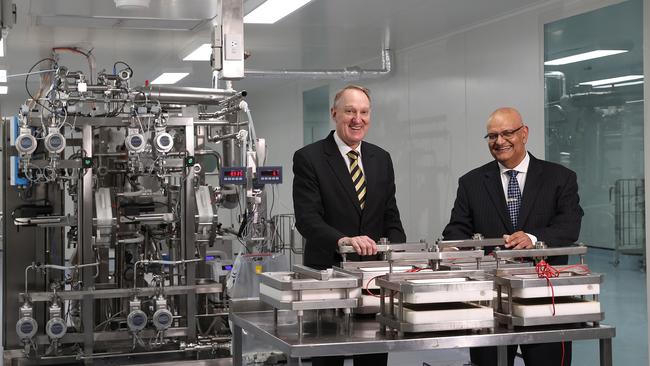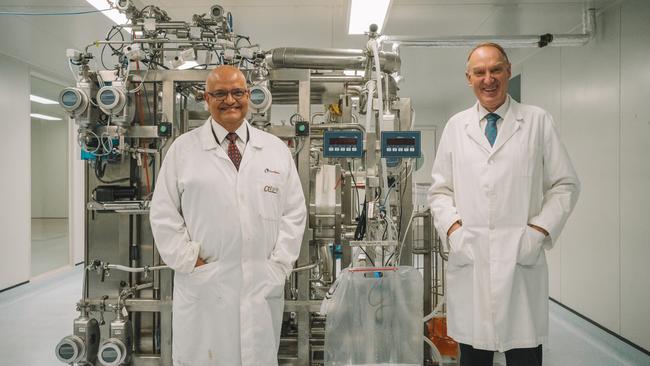Aegros relocating to Brisbane to take on CSL’s plasma monopoly and list on the ASX
Australian biotech Aegros has developed a TGA-approved plasma fractionation process that can double the yield of existing methods and make the country self-sufficient.

Brisbane has lured a Sydney-based company that hopes to up-end CSL’s monopoly on plasma processing.
Aegros, which plans a $300m-plus listing on the ASX next year, has developed plasma fractionation technology which it says can nearly double the yield compared with much bigger biotech companies such as CSL.
It is shifting its headquarters from Sydney to Brisbane and building a $450m fractionation plant to process one million litres of plasma equivalent a year, after attracting support from the Queensland government.
But to produce its hyperimmune products the company has to rely on imported costly plasma from the US rather than secure it for free from the National Blood Authority, which funds the collection of Australian plasma donations via Red Cross Lifeblood.
Aegros managing director John Manusu said this was holding back Australia from being self-sufficient in its plasma needs – a goal which could be met using Aegros’ technology rather than the current and dated fractionation methods.
“The problem is that CSL, because they are a monopoly, they are – and rightfully so – exercising monopolistic profits,” Mr Manusu said.
“They charge the Australian government $57 for every gram that they process of Australian plasma; plasma that is given to them for free.
“But the product that they cannot supply out of Australia, and it’s roughly 50 per cent … they charge $45 per gram for the same finished product, but that includes the cost of plasma.
“That’s called the monopolistic profit. And that is what the National Blood Authority would love to remove by having a second supplier, an Australian supplier.”
Mr Manusu says if the company could access free National Blood Authority-funded plasma collections, it would charge the government $45 a gram which is the same price CSL charges for its imported product.
“We’re not interested in destroying the market. We have offered $45, so we are saying ‘look, we’ll do it for the same price as international plasma’,” he said.
“It will reduce their costs, it’ll increase resource efficiency because we double the yield, so you could actually make Australia completely self sufficient, if we fractionated every litre of plasma collected in this country.
“That’s not going to happen, not anytime soon. But that’s what we could do with the facility in Queensland and this is why the National Blood Authority are so keen on it.”
In the past 15 years, the share of Australian-donated plasma has fallen from 82 to 52 per cent of the nation’s supply. During the same time, imports of immunoglobulins surged from 20 to 47 per cent.

Mr Manusu said Aegros’ Queensland factory would be able to supply 85 per cent of Australia’s demand for plasma-derived medicinal products, and was working with the University of Queensland and other Australian research institutions to develop the next generation of hyperimmunes to help combat the next pandemic.
He said Aegros can separate the proteins from plasma more efficiently than bigger companies because it uses a four-step process, which the Therapeutic Goods Administration has approved. This, he said, compared with other companies using as many as 15 steps, which results in the yield declining at each stage.
“No matter how good your process is, you’re never going to get 100 per cent yield out of every step,” he said.
“So if you take four or five steps and you’re getting a 90 per cent yield, you’re down to 50 per cent before you even know it, and that’s the problem that they have.”
The inefficiency that Mr Manusu highlighted was despite CSL spending almost $1bn on a new factory in Melbourne which can process up to 9.2 million plasma equivalent litres a year – a nine-fold increase on its current capacity – and export to more than 100 countries.
But he argued that CSL’s fractionation process, despite adopting automation, was still dated, given the regulatory approvals it has for its products in various jurisdictions.
“We had looked at licensing the technology back in 2000 and we had all of the practitioners look at it and say ‘it’s the future’,” he said.
“But the common point was, ‘I have a process which has been validated. It’s a cascade, so one product leads to the next product, leads to the next product – and if I change anything on the backbone, I have to take every one of those products back through the regulatory process. “That’s a 10-year a process that costs a couple of hundred million dollars. And that’s the quandary that they now find themselves in.
“We have those approvals because we’ve had to do that ourselves. But they don’t. And so it’s not just the technology but it’s the regulatory approvals that preclude them from adopting our process.”
But Aegros founding executive chair Hari Nair believes the tide is beginning to turn in the company’s favour.
“We’re not here to bag CSL. What has become very apparent for us is that during the pandemic, that having an alternative to CSL in terms of supply of plasma proteins is important in Australia,” Professor Nair said.
“And if you can do that with a much more efficient technology that is an Australian invented and developed technology, then that’s the way we should go.
“Innovation has its time and place. And this particular technology’s time and places is right now.”
The jostling with government red tape echoes another Brisbane-based biotech, rapid antigen test maker Ellume. Despite securing $US265m ($388.4m) from the US government to accelerate manufacturing, Ellume only received “cursory engagement” and “limited interest” from the former Coalition federal government when Australia was in desperate need of Covid-19 rapid antigen tests.
Ellume’s Australian operations subsequently were placed into administration, while its American business continued to thrive.




To join the conversation, please log in. Don't have an account? Register
Join the conversation, you are commenting as Logout